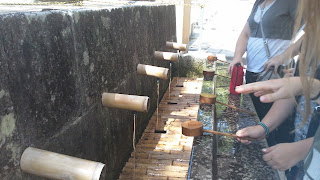During my stay in Japan, I haven’t been able to see much on sports. There’s not much free space that we can use (schedules and reservations constrain it as well), I don’t enjoy watching sports, so there hasn’t been very much time to pursue it.
The biggest exposure to sports during my stay was attending Morioka’s Junior High Sports Festival. All the Junior Highs in the city gathered at a park (in this awesome coliseum looking structure) and competed in various track and field events in a friendly fashion. They prepared for this for at least three weeks seeing as they had been practicing the cheering at school during the length of my stay. The cheering almost outshone the events themselves with various kanji, school names, and chants being formed by the student bodies like electronic led signs. They seemed to use it more as a community building activity rather than a rivalry based event.
This falls into what I seen it used as by Japanese before. During my stay at college, the Japanese exchange students could almost always be found at the gym and is how we became friends with them previous years: by playing sports. It’s also how we attempted and found our first friends here at Gandai.
Lastly, the only other experience with sports in Japan is what I’ve watched on tv with my family. The new stations seemed to religiously broadcast the World Track & Field event in Daegu last month, and gave the same treatment to World Gymnastics in Japan after that. Interesting, not only did they follow Japanese participants, but they would follow individuals from select countries: usually an American, a Chinese, and shockingly young or old participants. A lot of the commercials, especially around these events, show Japan’s women soccer team which won earlier this year as well. Between this fervor to follow sporting events and how they use it to build relationships, I would say it’s a pretty big part of there culture; but I believe this same sense of pride and friendship is something to be found in other countries as well.









